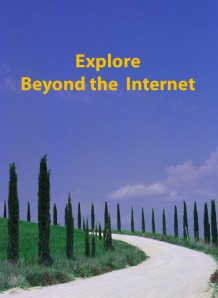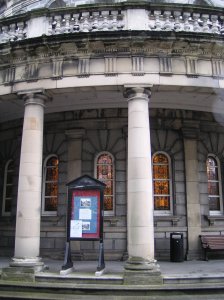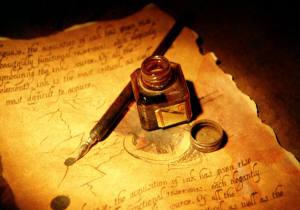
This is Week 29 in my Beyond the Internet series in which I explore the sources of information beyond our computer screens and the topic is University and Reference Library Special Collections.
While not technically archives, university libraries and other reference libraries hold a wealth of collections of primary documents which can be of great use to family historians. Many will visit their local state or national reference library or perhaps one in the location of their interest. However university libraries also hold fascinating collections beyond their usual book stacks. In some cases they will be among the oldest organisations for the region and being the venue for the hallowed halls of academia and academic research, they have accumulated all sorts of wonders. Perhaps it’s a bit intimidating to approach such august places as a lay person but in my experience you will usually be allowed to access the collections. Sometimes you surrender your driver’s licence or equivalent temporarily while there but that’s hardly a problem.
Well, to some extent that’s up to you and also to just what’s held in the collection. While the collections are increasingly catalogued online, it’s still worth checking any card indexes which may be held on site as sometimes earlier documents will not yet be listed online.
When searching you may need to be lateral in your approach. Sure, you can put a specific name into the catalogue search but it’s relatively unlikely you’ll get lucky unless your ancestor is the author or a book, document, or diary. However do try searching by ship’s name, the property where your ancestor worked, and the region or topic of interest. For example I might search by “Germans Darling Downs” or “Irish migration”.
Fryer Library of The University of Queensland was a source for the statistical accounts of Scotland in the days long before they were digitised. Other primary documents await me on my “to do” list for a future visit. Fryer also has many old Queensland newspapers on microfilm, not always the same ones available through SLQ: it’s definitely worth checking what’s available there in case they have different papers from those available at SLQ or on Trove.
The Mitchell Library at the State Library of New South Wales is also a treasure trove of documents and resources. What you find will depend on your specific interests. For example you may find a diary of your ancestor’s migration voyage.
Theses
 It can be a bit daunting to think about reading a thesis written for someone’s PhD or Masters. However there’s so much information contained in a thesis where the topic is relevant to your research that it’s well worth the effort. History theses in particular are usually well written and digestible by determined family historians. But don’t assume that it will only be a history thesis that’s of interest as economics or geography theses may hold nuggets of information you will find useful.
It can be a bit daunting to think about reading a thesis written for someone’s PhD or Masters. However there’s so much information contained in a thesis where the topic is relevant to your research that it’s well worth the effort. History theses in particular are usually well written and digestible by determined family historians. But don’t assume that it will only be a history thesis that’s of interest as economics or geography theses may hold nuggets of information you will find useful.
One of the most useful theses I’ve read was that by Richard Reid on Irish immigration to Australia 1848-1870. Luckily much of this has been incorporated in his recent book Farewell my Children but if you have Irish ancestry and find yourself in Canberra it might still be worth a visit to the ANU library.
Theses will also give you clues to further research opportunities as they will have a focus on primary documents and significant academic references.
This comparatively recent collaboration between The University of Queensland and the State Library of Queensland is a wonder. It includes a diverse array of information digitised for ready access including old theses (including some I’ve wanting to read for some time), directories, gazettes, books, journals and Hansard. If you have any Qld ancestry it’s definitely a resource to keep in mind.
International libraries
 International university libraries or city libraries may hold similarly valuable documents. During our 2010 visit to Glasgow I visited the University of Glasgow Archives which held the records of a shipping company I was interested in. While it didn’t turn up the specific information I’d been hoping for it was definitely worth checking it off my list. Sadly there were other repositories like the Mitchell Library in Glasgow that I’d hoped to visit but time disappears when you’re travelling and frustratingly I didn’t get there on that trip –maybe “next time”.
International university libraries or city libraries may hold similarly valuable documents. During our 2010 visit to Glasgow I visited the University of Glasgow Archives which held the records of a shipping company I was interested in. While it didn’t turn up the specific information I’d been hoping for it was definitely worth checking it off my list. Sadly there were other repositories like the Mitchell Library in Glasgow that I’d hoped to visit but time disappears when you’re travelling and frustratingly I didn’t get there on that trip –maybe “next time”.
At the University of Limerick I was able to read the MA thesis by Pat O’Brien on Crime in Broadford, County Clare in the 19th century. Thanks to the generous approval of the author I was also able to obtain a copy so I could digest the contents in a more leisurely read.
Limerick City Archives is another wonderful resource though when I visited to read the Board of Guardian minutes, on-site access was restricted. This is when online digitisation programs come to the fore. My parish of Kilseily in County Clare is part of the Limerick Union so the workhouse records are held in Limerick. These are now available online through the Limerick City Archives along with other great resources. Do you have Limerick or south-east Clare ancestry? If so definitely make a virtual visit and see what’s available.
My other top-ranking recommendation is the Clare County Library which has so many fantastic resources in the local history area but also available online. They have truly been leaders in the field of Irish research. It’s just a shame that more libraries haven’t followed their lead.
The other day I wrote about how the National Library of Ireland’s holdings of rent rolls told me more about my O’Brien relations’ lives in Bodyke.
There are so many treasures just waiting to be discovered in these libraries. I hope that this topic will encourage you to broaden your research if you haven’t already visited the relevant university or local reference library. All you need is time, time and more time; persistence and more persistence.
Please do share your experiences using any of these resources, either in the comments or on your blog.

I haven’t yet found anything useful in local university libraries, but I am a member of both the State Library of NSW and the National Library of Australia. I’ve been to the State Library and found some wonderfully useful information there, plus even though I don’t live in Canberra and am not likely to visit the NLA any time soon, I have access to some very useful electronic resources that I can log in to from home. Ditto with the State Library – I access their historical newspapers (British and other countries) resources all the time.
LikeLike
Too true Prue, it can be the luck of the draw what you find where, but definitely worth keeping in mind I think. And yes, those online access opportunities are great!
LikeLike